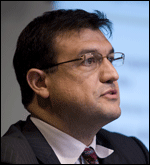Energy and Oil Reform in the Americas
The story of the oil industry in Latin America in recent years has been one of both highs and lows. A panel of four experts was convened to evaluate the current climate for significant reform in the region.
Overview
The story of the oil industry in Latin America in recent years has been one of both highs and lows, with positive news from countries such as Brazil and Colombia, and less encouraging developments in Mexico and Venezuela. The Latin American Program and its institutes on Brazil and Mexico, along with the Global Energy Initiative, convened four experts to evaluate the current climate for significant reform in the aforementioned countries.
Brazil: Killing the Goose Before It Lays the Golden Egg?
New discoveries, healthy corporate finances and an open attitude to foreign investment helped PETROBRAS establish itself as a global leader in the industry. Eurasia Group's Christopher Garman focused on the new regulatory framework in Brazil's pre-salt region, arguing that the new arrangements reflect a number of business, economic, and political concerns on the part of the Lula administration. He put forward three scenarios for congressional approval of the Lula administration's proposals, with Congress approving the government's entire proposal being the most likely.
Mexico: Approaching the Precipice After 2005, Mexico faced declining reserves, rapidly falling production and political stagnation over the question of oil policy reform, raising fears of collapse of both PEMEX and the nation's finances. According to Duncan Wood of Instituto Tecnológico Autónomo de Mexico and the Center for Strategic and International Studies, changes to the administrative structure of PEMEX, a new regulatory framework, citizen bonds, and the possibility of new contracts for service providers are unlikely to have a profound impact on production numbers or reserves in the short term. While he proposed three scenarios relating to the prospect for further reform in the Mexican oil sector, the most probable scenario envisions Mexico reaching a crisis point around 2015, causing balance of payments problems and further fiscal imbalances.
After 2005, Mexico faced declining reserves, rapidly falling production and political stagnation over the question of oil policy reform, raising fears of collapse of both PEMEX and the nation's finances. According to Duncan Wood of Instituto Tecnológico Autónomo de Mexico and the Center for Strategic and International Studies, changes to the administrative structure of PEMEX, a new regulatory framework, citizen bonds, and the possibility of new contracts for service providers are unlikely to have a profound impact on production numbers or reserves in the short term. While he proposed three scenarios relating to the prospect for further reform in the Mexican oil sector, the most probable scenario envisions Mexico reaching a crisis point around 2015, causing balance of payments problems and further fiscal imbalances.
Venezuela: The Challenges of Consolidating State Control The rise of Bolivarian oil nationalism under Hugo Chávez brought with it a process of renegotiation with international oil companies (IOCs) over access to the country's massive reserves. Universidad Central de Venezuela's Ana María Sanjuán stated that although "authentic" nationalization and true oil sovereignty have been advanced in recent years by the Chávez administration, the benefits remain to be seen. She also pointed to the polarized public opinion over PDVSA and the Chávez government's administration of Venezuelan oil; more worrisome in the short term is the growing debate over PDVSA's indebtedness. Sanjuán concluded that Venezuela has committed to providing oil to some nations, but probably will not be able to raise capacity to meet those commitments.
The rise of Bolivarian oil nationalism under Hugo Chávez brought with it a process of renegotiation with international oil companies (IOCs) over access to the country's massive reserves. Universidad Central de Venezuela's Ana María Sanjuán stated that although "authentic" nationalization and true oil sovereignty have been advanced in recent years by the Chávez administration, the benefits remain to be seen. She also pointed to the polarized public opinion over PDVSA and the Chávez government's administration of Venezuelan oil; more worrisome in the short term is the growing debate over PDVSA's indebtedness. Sanjuán concluded that Venezuela has committed to providing oil to some nations, but probably will not be able to raise capacity to meet those commitments.
Colombia: Work Left to Do
The Colombian government has brought in a new regulatory framework, and the state-owned national oil company (NOC) ECOPETROL increased its reserves and production. Roger Tissot of GasEnergy Latin America stated that Colombia can benefit significantly if investments pay off and oil prices recover. He suggested that the government work harder to secure more local investment in the sector and to encourage more local junior oil companies to participate. Tissot also believed the government should work on pipeline integrity to ensure the safe transport of oil and to prevent further environmental problems.
Documents & Downloads
- Energy and Oil Reform in the AmericasDownload
- Energy and Oil Reform in the AmericasDownload
- Energy and Oil Reform in the AmericasDownload
- Energy and Oil Reform in the AmericasDownload
- Energy and Oil Reform in the AmericasDownload
- Energy and Oil Reform in the AmericasDownload
- Energy and Oil Reform in the AmericasDownload
- Energy and Oil Reform in the AmericasDownload
- Energy and Oil Reform in the AmericasDownload
- Energy and Oil Reform in the AmericasDownload
Speakers
Hosted By

Latin America Program
The Wilson Center’s prestigious Latin America Program provides non-partisan expertise to a broad community of decision makers in the United States and Latin America on critical policy issues facing the Hemisphere. The Program provides insightful and actionable research for policymakers, private sector leaders, journalists, and public intellectuals in the United States and Latin America. To bridge the gap between scholarship and policy action, it fosters new inquiry, sponsors high-level public and private meetings among multiple stakeholders, and explores policy options to improve outcomes for citizens throughout the Americas. Drawing on the Wilson Center’s strength as the nation’s key non-partisan policy forum, the Program serves as a trusted source of analysis and a vital point of contact between the worlds of scholarship and action. Read more

Brazil Institute
The Brazil Institute—the only country-specific policy institution focused on Brazil in Washington—aims to deepen understanding of Brazil’s complex landscape and strengthen relations between Brazilian and U.S. institutions across all sectors. Our mission is to provide thoughtful leadership and innovative ideas to help democracies evolve and enhance their capacity to deliver results. We achieve this by producing independent research and programs that bridge the gap between scholarship and policy, while serving as a hub for policymakers, scholars, and private sector leaders. Read more

Mexico Institute
The Mexico Institute seeks to improve understanding, communication, and cooperation between Mexico and the United States by promoting original research, encouraging public discussion, and proposing policy options for enhancing the bilateral relationship. A binational Advisory Board, chaired by Luis Téllez and Earl Anthony Wayne, oversees the work of the Mexico Institute. Read more
Thank you for your interest in this event. Please send any feedback or questions to our Events staff.












